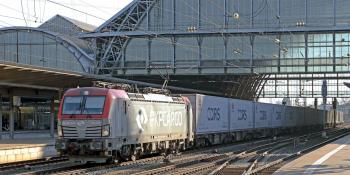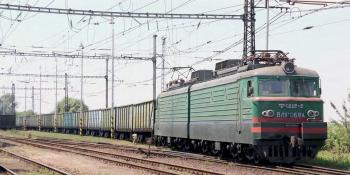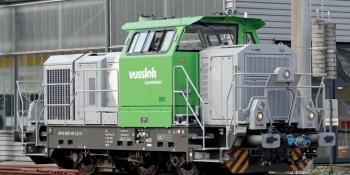
EUROPE
EUROSTAR TO AMSTERDAM IN SPRING 2018
Eurostar plans an inaugural run from London to Amsterdam in December, but its full service between the cities will now begin in spring 2018. The operator plans to ramp up services during the first few months of next year, with full operation beginning at Easter. Services will be operated using the Class 374 e320 trains working two train pairs daily; a third train pair may be introduced later in 2018.
More detail of the operation is now available thanks to extensive media reports in the Netherlands! Passengers from London will undergo security and immigration screening in London as now for Brussels services. The return services will use platforms at Amsterdam Centraal and Rotterdam Centraal that have been specially adapted for, but not dedicated to, Eurostar services. It appears only the rear half of the 16-coach train will be used for passengers joining in Amsterdam/Rotterdam and cleared by both security and immigration screening for an uninterrupted trip to London; the other half of the train will be filled in Brussels (and will be kept free of passengers between Amsterdam and Brussels by on-board staff). It seems likely the trains will operate using the ring line around central Brussels via Brussels Ouest in both directions, enabling them to reverse in the dedicated Eurostar platforms at Brussels Midi.
Dutch infrastructure manager Prorail is planning to build a temporary, but stylish-looking, 600 square metre building at the eastern end of platform 15b at Amsterdam Centraal to house security and immigration screening and a passenger lounge. This building will be temporary (and will replace temporary office accommodation currently in the same place) as major remodelling planned for the station will change its long-term location; around 70% of passengers from the Netherlands to the UK are expected to board in Amsterdam. A smaller 400 square metre, long and thin but permanent structure is planned at Rotterdam CS at the Amsterdam end of platforms 3 and 4; London-bound Eurostar services will use platform 4.
The operation for Eurostar trains at Amsterdam (with similar arrangements at Rotterdam) as reported by Dutch media envisages check-in opening 75 minutes before departure and closing 12.5 minutes prior to departure. The platforms being used will be available to regular services until 30 minutes before the Eurostar departure, after which the platform will be cleared and sealed by security staff with barriers as necessary. Eurostar passengers will only be permitted on the platform in the eight minutes before departure and the train itself will only arrive, from a secure stabling area east of Amsterdam CS, six minutes before departure.
It is unclear whether Schiphol Airport will be served by London-bound Eurostar services as capacity restrictions preclude a dedicated platform available for 30 minutes; in any case, the airport is served by frequent services to both Amsterdam and Rotterdam, where passengers could interchange. If a London-bound pick-up is provided, it seems passengers will use the front half of the train and have to get off for security and immigration screening in Brussels. We have previously reported that Antwerp will be served by trains from London but not by those to London, with passengers using other services to join Eurostar in Brussels.
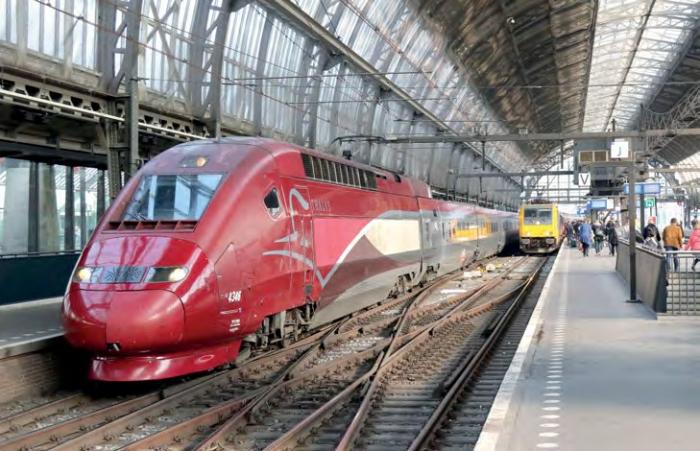
In mid-March, Eurostar started the promotion of through fares to Bordeaux from 2 July using the new LGV Sud Europe Atlantique (LGV SEA) high-speed line south from Tours to Bordeaux, which opens that day. This would appear to be in advance of the planned London to Bordeaux service the company has previously said it is considering once LGV SEA is open.
BETTER TIMES AHEAD?
Eurostar has reported better financial results for the first quarter of 2017, with sales up 12% year-on-year. This follows a torrid year in 2016 when the twin effects of terror attacks in several European cities affected demand and the UK decision to leave the European Union depressed revenues earned due to the sharp fall in the value of the pound against the Euro following the referendum. Passenger numbers fell 4% in 2016 (from 10.4 million to 10 million) and revenues decreased by 3% to £794 million. Eurostar has reported the combination of tough trading conditions and lower demand resulted in an underlying operating loss of £25 million in 2016.
Our thanks to John Morris for some of the information in this item.
CLASS 374 WORKING TO BRUSSELS
Eurostar launched the start of Class 374 Velaro e320 services between London and Brussels on 23 May. Regular services began on 28 May, although the majority are still operated by the lower-capacity original Class 373 trains. The Class 374 fleet is now nearly complete; the final bodyshells for the last train were being made at Siemens’ Krefeld plant in late March and all 17 trains on order should be available for service by December. Eurostar announced in March that all the Class 374 trains and the refurbished Class 373 trains will be in service by September 2018; exactly how many Class 373 trains are being refurbished remains unclear.
GREENBRIAR EUROPE AND ASTRA TO MERGE
Greenbriar, based in Oregon in the USA, and Romanian firm Astra completed their plans to create what they say is the largest European wagon manufacturer on 1 June. The new merged Greenbrier-Astra Rail will be based in the Netherlands and includes all the European activities of both companies; Greenbriar owns 75% of the merged company and Astra’s owner the remaining 25%. Greenbriar was based in Germany and has a major manufacturing centre in Świdnica, south west of Wroclaw in Poland, plus other Polish workshops. In recent years Greenbriar has built wagons for UK operators, including GB Railfreight. Romanian-based Astra has factories and workshops at Arad, Caracal and Severin in Romania. Astra builds wagons at its Romanian factories and has previously supplied them to Network Rail.
BEACON RAIL SOLD AS DIESEL LEASING MARKET CONSOLIDATES
US-based investment manager JP Morgan Asset Management has agreed to buy the entire Beacon Rail vehicle leasing business from its existing owner, London-based Pamplona Capital Management. Pamplona manages investments for several corporate investors, including Russia’s largest privately-owned bank, Alfa Bank. The transaction is valued at around £855 million. Pamplona had bought Luxembourg-based Beacon Rail in 2014 for $450 million and has invested in building the business both through acquisition (such as the purchase of Ascendos Rail Leasing in 2016) plus some second-hand rolling stock, for example in Scandinavia and Germany. It has also ordered new assets such as Euro 4000 diesel locos for use in France and Spain, and in the UK the Class 68/88 loco fleets and the new CAF-built Mk 5 coaches for Caledonian Sleeper and TransPennine Express services.
Prior to 2009, Beacon Rail was the European arm of HSBC Rail (UK) (it was sold by HSBC to newly-created Beacon Rail Leasing, a subsidiary of US-based investor BTMU Capital Corporation). In recent years it has become one of the leading providers of diesel locos to the European market, both through new build (e.g. UK Class 68) and by buying second-hand locos, especially EMD Class 66 designs and Siemens’ Eurorunner (German Class 223). Japanese-owned Mitsui Rail Capital Europe (MRCE) has previously sold many of its diesel locos to Beacon. In a recent transaction Mitsui sold almost all the remaining diesel locos it owns (32 Vossloh-built mid-range diesels of various types) to an Irish-registered company, RIVE Rail Leasing Ltd, which is in turn owned by several investors including existing German-based ROSCO Northrail and French wagon leasing specialist Millet. MRCE, in common with many of its competitors such as Railpool and European Locomotive Leasing, continues to lease a wide range of modern electric locomotives to freight and passenger operators across Europe.
BOSNIA AND HERZEGOVINA
REOPENING PLANNED FOR UNA VALLEY LINE
The transport ministers of Bosnia and Herzegovina and Croatia have agreed to plan the reopening of the railway line between Knin in Croatia and Novi Grad, now located in the Serbian majority Republika Srpska part of Bosnia. The two governments plan to seek EU funding for the project.
The 178km-long line starts in Novi Grad and largely follows the river Una, but serves several Bosnian towns in the Muslim majority Federation of Bosnia and Herzegovina such as Bihać and Martin Brod. The line crosses not only the intra-Bosnian administrative border but also the border between Bosnia and Croatia multiple times. Built in the days of the Austro-Hungarian Empire and pre-World War 2 Yugoslavia, the line follows the river, which since the late 1990s has been an international border. The line was electrified by Yugoslav Railways at 25kV AC in 1987 (just prior to the 1990s wars) and offered the shortest route from Zagreb to the Adriatic ports of Zadar and Split.
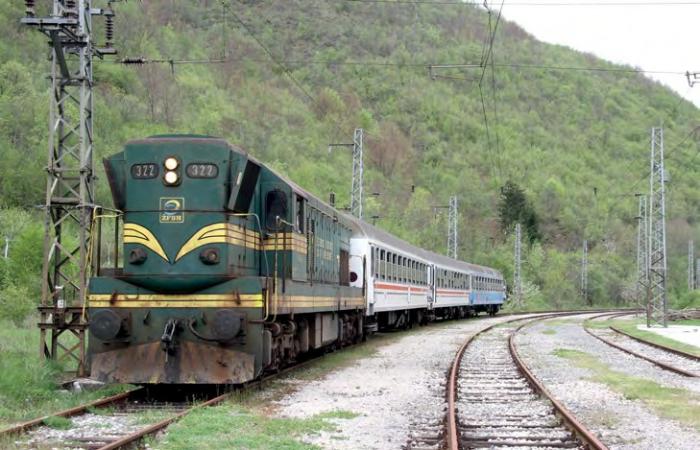
Much of the territory the railway passes through was incorporated in the breakaway Republic of Serbian Krajina in 1991 and fought over during the 1990s Balkan Wars by both Bosnian and Croatian forces opposing Serb irregular forces. An armoured train constructed by Serb forces at Knin during the mid-1990s conflict is still partially in existence at various places in the region, albeit in scrap condition; this was mainly used on the Knin to Bihać section of the line, especially during the three-year siege of Bihać between 1992 and 1995. The line was reopened in 1998 by NATO troops after wartime damage had been repaired and mines cleared on 15 metres either side of the line.
Željeznice Republike Srpske, the Serb-administered railway operator in Bosnia, and Bosnian Federation rail company Željeznice Federacije Bosne i Hercegovine (ŽFBH) administer the route in their respective sections of Bosnian territory. The Bosnian section totals around 120km, with around 58km in Croatia where national infrastructure manager HŽ Infra is responsible for the line.
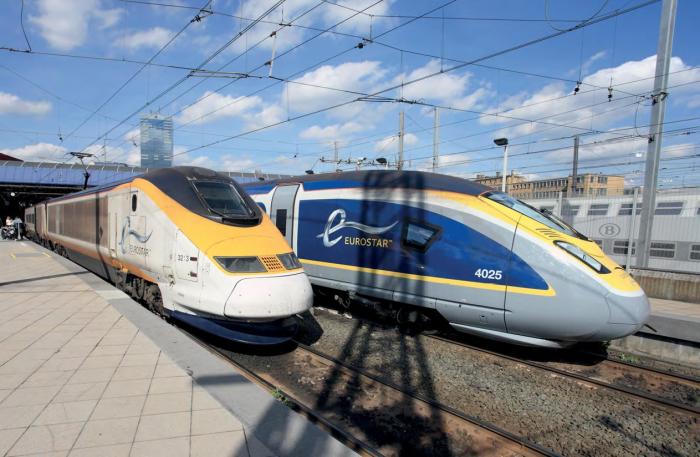
CZECH REPUBLIC
TRAXX FOR REGIOJET – AND SERVICES TO VIENNA
Czech open access operator Regiojet has ordered eight Traxx MS electric locos from Bombardier. The tri-voltage locos (3kV DC, 15kV AC and 25kV AC) will be equipped for operation in the Czech Republic, Slovakia, Germany, Poland, Austria and Hungary. The first three locos should be delivered before December, with the rest following in early 2018. An option for a further 20 locos has been agreed. Regiojet has also announced the purchase of 16 more 200km/h open passenger coaches from Romanian supplier Astra Vagoane Călători, to add to the 10 already in use.
The new locos and vehicles are part of ambitious plans announced by Regiojet to not only increase service frequencies on the line between Prague and the Czech Republic’s second city Brno but also to compete head-on with Czech national operator ČD and its Austrian partner national operator OBB in operating services between Prague and Vienna. Regiojet only began services on the Prague to Brno/Bratislava route in December 2016 and currently operates three train pairs. The new services to Vienna will start in December, with four train pairs daily; in addition, another four train pairs will operate between Prague and Brno, some continuing to Bratislava in Slovakia or other Czech destinations.
The new services to Vienna will be operated in partnership with Graz-based rail operator Graz-Koflacher Bahn (GKB), which like OBB is owned by the Austrian government! RegioJet says it intends to exclusively co-operate with GKB in developing other services in Austria. Extension of the new Vienna trains to Graz is a likely early step, thus competing directly with the ČD/OBB Railjet service between Prague and Graz (via Vienna), which currently operates on a two-hourly pattern. It seems likely Regiojet will reduce its substantial long-distance bus operation on the Prague – Brno and Prague – Vienna routes once its new services are operating.
…AND VECTRON FOR ČD
In early May Czech national operator ČD signed a 10-year, €48 million lease for Vectron MS electric locos (German Class 193/Czech Class 383) with European Locomotive Leasing (ELL). The locos will be used to operate international passenger services on the Prague to Dresden/ Berlin/Hamburg route from November, replacing a small fleet of 1990-vintage Skoda-built Class 371 dual-voltage locos currently used.
Originally ČD had planned to use its fleet of modern Class 380 locos supplied by Skoda, and these obtained limited approval for use in Germany during 2016. Practical experience at the beginning of the new timetable, when Class 380s were diagrammed to work Eurocity trains between Prague and Dresden, showed these were not compatible with DB-operated coaching stock when operating under 15kV AC catenary, and consequently they were immediately replaced by the Class 371 fleet again.
ČD freight subsidiary ČD Cargo (ČDC) has also ordered three more Class 383 Vectron MS locos for delivery early next year, to add to five delivered in 2016. These are now used operating freight trains from the south of the Czech Republic as far north as the Baltic coast in Germany. ČD Cargo is reportedly very pleased with their performance, which has allowed the operator to avoid time-consuming loco changes at national borders or electrification boundaries. The ČDC locos are designed for use in the Czech Republic, Slovakia, Germany, Poland, Austria, Hungary and Romania. Czech private freight operators are also ordering Vectrons; oil transport specialist Unipetrol Doprava has recently ordered three Vectron MS locos for delivery from December 2017.
GERMANY
WANNACRY COMPUTER VIRUS HITS DB
The ‘malware’ attack by computer hackers using ransomware software known as Wannacry that brought chaos to many parts of the NHS in mid-May 2017 also infected computers across the globe, with railway operators in Germany and Russia affected.
German national operator Deutsche Bahn had to shut down its computer-based information systems at many main stations as the ransomware had infected the PCs used to operate the system. In major stations such as Frankfurt am Main Hbf, staff had to resort to using chalk boards to show where trains would depart from. In Russia, several government agencies including state rail operator RZD reported problems caused by the ransomware.
ELECTRIFICATION AND CAF EMUs FOR SCHÖNBUCHBAHN
The 17km Boblingen to Dettenhausen branch line, known as the Schonbuchbahn and located south west of Stuttgart, is being electrified at 15kV AC 20 years after reopening to passenger services. The line lost passenger services in 1967 and closed to freight in 1990. Efforts to reopen the line led to the creation of a transport association for just the one line (others in Germany cover hundreds of kilometres of the network). Local government in the two counties the line connects (Boblingen and Tubingen) formed the Zweckverband Schonbuchbahn (ZVS), and in 1993 bought the line from DB for a symbolic Deutschmark. The line reopened in 1996 using Regioshuttle DMUs. Infrastructure management is undertaken by ZVS, and operation is currently contracted to Transdev subsidiary Wurttembergische Eisenbahngesellschaft. Passenger numbers had grown to over 10,000 a day by 2012!
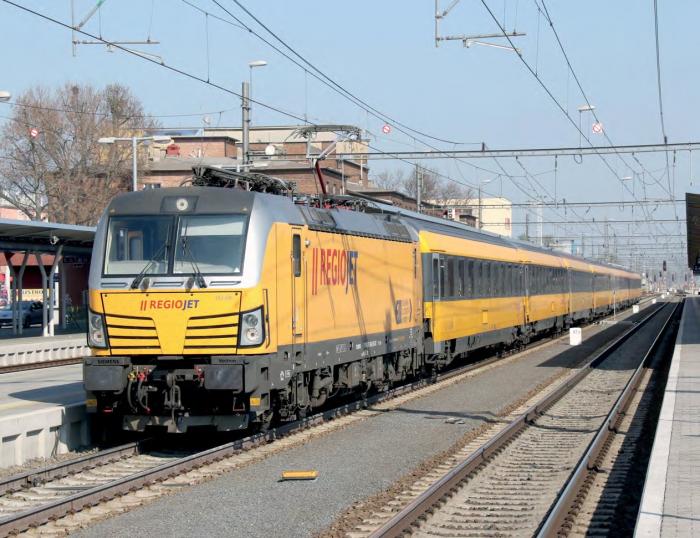
The same local authorities are now funding through ZVS €38.5 million of the €93.8 million electrification cost; the Baden-Wurttemberg region is also providing a similar sum. The majority of the expenditure (€51.3 million) is for a fleet of nine new 40-metre, 94-seat 100km/h EMUs being supplied to ZVS by CAF; the trains are designed for high capacity with space for 118 standing passengers, and a 15-minute frequency is planned after electrification. A 19-year maintenance contract for the new trains worth another €22.9 million has also been agreed with CAF; this is the first such contract the company has won in Germany. Electrification work began officially on 11 November 2016. The work will be completed by December 2018, although delays in ordering the new trains mean they are not due in service before 2020.
IRELAND
MAYO URGES IÉ TO INCREASE FREIGHT CAPACITY
Members of Mayo County Council have asked Iarnrod Eireann (IE) to increase freight capacity within the county. Currently Mayo is one of the busiest areas in Ireland for rail freight, with around 16 intermodal trains per week for IWT (International Warehousing and Transport) and DFDS to and from Ballina and two or three timber trains per week from Westport and Ballina. The IWT trains operate daily to Dublin Port; the DFDS and timber trains run to and from Waterford. IE advised the council meeting that it is keen to increase services, however it was dependent upon investment being provided to it for infrastructure improvements, as routes to Mayo are single track.
Mayo County Council points out that reopening the Western Rail Corridor between Claremorris and Athenry would ease the current pathing difficulties and also give better access to Foynes Port near Limerick, where owner Shannon Foynes Port Company is seeking to have the branch from Limerick to the port reopened. Tim Casterton
PUBLIC VOTE FOR BEST STATION
The IE ‘Best Station Awards’ ceremony took place at Inchicore Works, Dublin on 11 May, with Dublin Pearse named ‘Overall Best Station’ in Ireland. Hazelhatch & Celbridge station received the accolade of Ireland’s best commuter station. Regional awards went to Athlone, Templemore and Carrick-on-Shannon. A special award was also presented for the best customer service, with Sligo scooping the award. Winners were chosen by the public, with almost 15,000 people voting as part of the competition. Customers were asked to rate customer information, appearance and staff helpfulness at the 144 stations on the IE network. Tim Casterton
FIRST CRUISE CHARTER TRAIN FROM COBH TO KILLARNEY
On Easter Monday ‘Railtours Ireland’ operated the first of 16 contracted charter trains scheduled to run in 2017 for cruise passengers wishing to visit Killarney, a historic town in County Kerry, south western Ireland. The train ran in connection with the visit of Princess Cruises Caribbean Princess, with over 3,000 passengers on board to Cobh over Easter. Cobh railway station is adjacent to the cruise terminal, and the port is famous for being the last port of call of the ill-fated Titanic. Patronage was good and the train, formed of a chartered Iarnrod Eireann (IE) three-car Intercity railcar, departed at 08.40 for the 72-mile journey, which involved a reversal at Mallow. The return journey departed at 14.25.
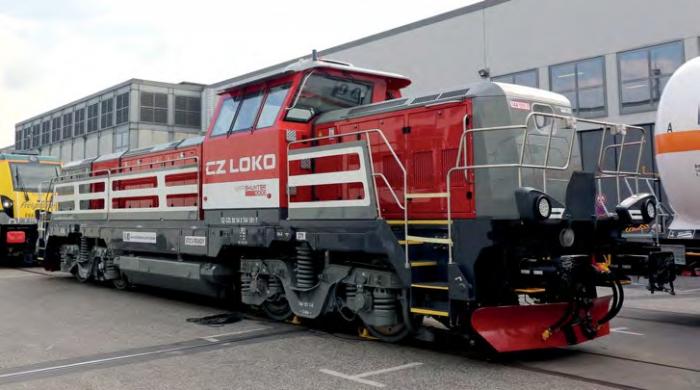
ITALY
EFFISHUNTERS FOR TRENITALIA
Trenitalia-owned freight and terminal operations specialist Serfer Servizi Ferroviari, based in Genoa, has ordered five EffiShunter 1000 locomotives from Czech diesel loco specialist builder CZ Loko. The locos are due for delivery by February 2018, and an option for five more has been agreed. The EffiShunter 1000 is a four-axle design utilising 895kW Caterpillar C32 engines. CZ Loko has previously supplied small numbers of locos to other Italian operators. The type is pictured on display at Innotrans in September 2016 (with a Freightliner-liveried Pesa-built ‘Dragon’ electric loco behind it). Keith Fender
Jim Deegan, director of Railtours Ireland, told Modern Railways the cruise companies are striving to make their operations environmentally sustainable and the concept of shore excursions by rail appeals to them. IE also scheduled seven additional ‘cruise liner’ trains from Cobh to Cork on the Monday to cope with passenger numbers from the cruise ship. Tim Casterton
MONTENEGRO
LAST-MINUTE CANCELLATION FOR MONTECARGO PRIVATISATION
The Montenegrin Government has cancelled the planned sale of 51% of national rail freight operator Montecargo, plus a minority stake in the Adriatic port of Bar, to Polish logistics firm OT Logistics (p80, March issue). The government’s Council for Privatisation & Capital Projects cancelled the sale on the basis that it was not in the country’s economic, social or security interests, despite stating the process had been both transparent and fair! OT Logistics had not expected such an outcome, and told local media the decision was ‘completely incomprehensible’ as well as totally unexpected; negotiations had been finalised in March without any suggestion of a change of plan by the relatively newly-elected Government.
POLAND
SCHEDULED MAIN LINE STEAM RETURNS!
Regular scheduled steam-operated passenger trains returned to the main line in Poland on 15 May 2017. Services now operate from the museum depot at Wolsztyn, west of Poznan, six days a week. Currently two former PKP locos are available for use. Steam-operated services survived in Wolsztyn until three years ago, long outlasting the general withdrawal of steam by PKP in the early 1990s.
The fact that the Wolsztyn Experience company offered steam driver training courses in co-operation with national freight operator PKP Cargo and passenger operators led to steam operation remaining in place for many years, although it ended in 2014 due to a combination of factors. Privatisation of PKP Cargo led to worries the shed at Wolsztyn would close, and the replacement of loco-operated trains by new DMUs bought by the Wielkopolska (Greater Poland) region also threatened the steam operation, despite it being recognised as a major tourist attraction in its own right. Fortunately, the various parties involved, with help from the Wolsztyn Experience and even a visit from the UK’s ambassador in Warsaw, reached agreement in June 2016 to transfer the steam operation to a new heritage foundation funded by PKP Cargo and the regional government.
Services will normally operate from Wolsztyn to Leszno on weekdays and between Wolsztyn and Poznan on Saturdays; the timetables issued by operator Koleje Wielkopolskie indicate which trains are steam. During July and August, the steam operation will be altered and will run between Wolsztyn and Zbąszynek, as the other routes are closed for track renewal work.
